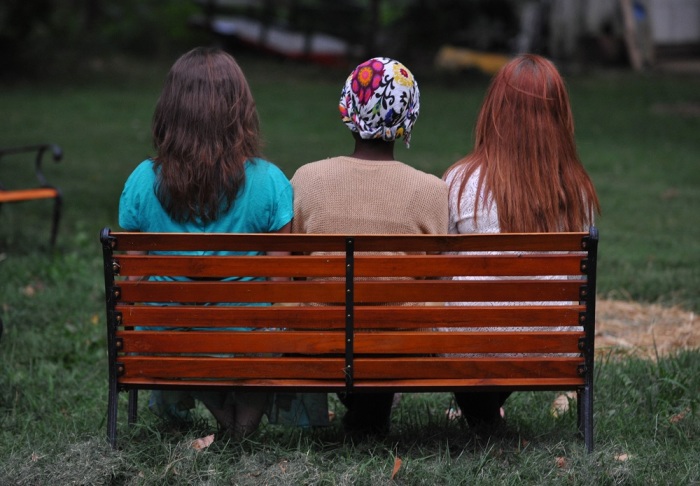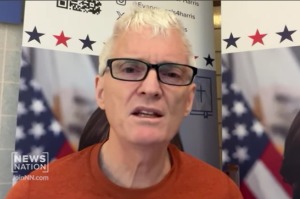Human Trafficking Prevention Month: Christian Organization Says Sex Slavery Can Happen to Anyone; Some Girls Hold Master's Degrees

A Christian organization that runs a restorative shelter program in the U.S. for women recovering from domestic human trafficking has pointed out ahead of National Human Trafficking Prevention month in January that anyone can be pulled into sex trafficking — its shelter has girls with master's degrees, and those that come from affluent families. The Samaritan Women organization urges churches to offer hands-on engagement and respond not with judgment, but with compassion toward victims.
The Samaritan Women is one if the organizations that appears in the newly released documentary "In Plain Sight," which seeks to raise awareness for National Human Trafficking Prevention month in January.
Jeanne Allert, the group's founder and executive director, told The Christian Post in a phone interview that people often have misconceptions about people who fall into human trafficking, and argued that it can happen to anybody.
"We have girls in our program that have master's degrees; that came from affluent families. We tend to make these stereotypes, as if this can happen to only one type of person — to somebody from a drug-addicted household, who was promiscuous. And it's really not true — it's quite pervasive. Perhaps the most common denominator that we see [is that] 94 percent of women who come into our program are victims of child sexual assault. And that can happen in any home," Allert told CP.
Based in Maryland, The Samaritan Women began work in 2007 raising awareness for domestic issues on human trafficking, and spent its first three years educating people and helping them understand that the issue is a local problem.

Several anti-trafficking groups put the number of human slaves on a global scale to over 30 million, while the U.S. Department of State has estimated there are between 14,500-17,500 people trafficked annually in America. Allert said that it's difficult to get accurate numbers in the U.S., however, because the State Department, FBI, Department of Justice and Homeland Security all have different statistics.
Groups such as The Samaritan Women have been working hard to provide the victims restorative programs that benefit them physically, mentally, and spiritually, however.
Allert's organization focused on the mid-Atlantic area, which along with the Baltimore-Washington airport is one of the hubs for sex trafficking in the country. In 2011, the group launched its restoration home, which is a Christian long-term shelter for victims of human trafficking in the U.S.
The Samaritan Women founder argued that it's not so much a lack of awareness that allows for human trafficking to thrive in the U.S., but a willingness within people to exploit others for pleasure and profit. Allert said that the "inherent sin deposition, which is pride, lust and greed, is the perpetuating problem."
As for the way American churches have responded to the problem of human trafficking, Allert said that she has a divided opinion on the matter.
"One, I'm very encouraged by the fact that if you look at the rescue and restore coalitions across the United States, or the anti-trafficking agencies that have bubbled up, close to half of them have come from the Christian community, from faith-based organizations that are courageously becoming involved in this issue," she said.
"But at the same time, I have to say that we have much further to go in making a real impact. Right now, it's kind of the contemporary issue of the day, and we'll see the really progressive churches, but also the Methodist church and the Catholic church, have come out to take a national stance against slavery of persons. So I think that there is progress, but on a local level we have so much more to do. Because if you go pulpit to pulpit, you don't hear people talking about sexual wounding and sexual offenses, and how sexual sin is really destroying families and children."
Allert added that people must stop placing the blame on victims, and instead approach individuals with "much more of a Christian compassion instead of judgment."
She continued that it's important for Americans and the church to understand that there are no real federal or state programs that provide care for victims.
"First, we don't recognize that we have this as a domestic problem. There are no legacy programs that provide for their funding, their education, their vocational development, their housing. So we're in a state in America right now where this had to be a grass-roots effort," she said.
The Samaritan Women founder noted that Jesus Christ invested in people all the time, even if the odds looked against them:
"The Old Testament speaks so much about taking the most unlikely and investing in that person. Much like the story of the Samaritan woman, she becomes the first evangelist, in spite of all that she had ever done."
Allert called on churches to offer not just financial support, but "hands on engagement" on the issue.
As for the victims of human trafficking themselves, Allert noted that when a woman finds herself at a rescue shelter, her primary needs are very basic — such as food, clothing, shelter, a sense of safety.
The victims must face up to some deep psychological wounding, however.
"Often times there is a trauma bond that has been formed with her captor, or with a larger network. She doesn't feel like she can reenter society, she doesn't feel like she belongs anywhere. She tends to gravitate to what she knows, which is the trauma environment."
She added that from a spiritual standpoint, the victims have a lot of questions.
"They've seen evil, they've seen horrific things, and unfortunately, some of them have been forced to participate in horrific things. In this population, shame is a huge spiritual concern that we have to deal with layer upon layer," Allert continued.
"She has to receive God's forgiveness, but also forgive herself; forgive those who perpetrated against her — it's a tremendous amount of work."
Allert also spoke about the "In Plain Sight" documentary, and said the film takes a different angle by looking more at avenues for solution to human trafficking instead of focusing only on the grim situation. The Samaritan Women was featured in the movie as one of five agencies across America that take in survivors and offer long-term restorative care.
"This film is a documentary of encouragement, and possibility, particularly when juxtaposed against all of the doom and gloom messaging that's available. This is one that says 'restoration really is possible.' We have to have hope, and we have to have courage," Allert concluded.
Further information about "In Plain Sight," including upcoming screenings, is available on The Samaritan Women's website.




























